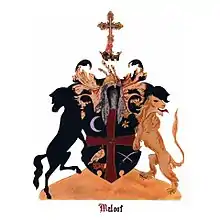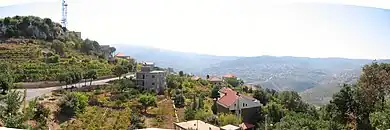Maalouf
Maalouf (alternative spellings: Maloof, Malouf, Malouff, Maluf, Malluf; Arabic: معلوف المعلوف) is an Arabic surname.
 Coat of arms of the Maalouf family | |
| Pronunciation | [maʕˈluːf] |
|---|---|
| Language(s) | Arabic |
| Origin | |
| Meaning | Derived from the Arabic Maayuf (معيوف) meaning "left out" under Islamic rule. |
| Region of origin | Lebanon |
| Other names | |
| Related names | Malouf, Maloof, Majluf, Maluf, Malluf, Maaluf |
Origins
The Maalouf family belongs to the group of tribes known as Ghassanids that emigrated from Yemen to Houran in modern Syria prior to the collapse of the Marib Dam (Arabic: سد مأرب) around 102 AD The clan governed Houran and large surrounding regions for nearly 500 years until the Islamic conquest in 637 AD.
After the arrival of Islam, some members converted to Islam while most remained Christian mainly Antiochian Eastern-Orthodox and Melkite Greek Catholic. Several prominent leaders are said to have received the special appellation of Maayuf (معيوف) meaning “exempted” or “protected.” When the ruling government subsequently rescinded this appellation, many clan members retained it in the form of a surname Maalouf, or Al-Maalouf. However, that version of the origin of the family name is disputed.
Ibrahim Maalouf nicknamed "Abi Rajih" (Arabic: ابي راجح) reflecting his wisdom was a prominent and rich landowner in the town or village of Upper Damia in Houran. He had seven sons: Issa (عيسى), Medlej (مدلج), Farah (فرح), Hanna (حنا), Nasser (ناصر), Nehme (نعمة), and Semaan (سمعان). For political, social and religious reasons, and as a result of a conflict that his family engaged in with neighboring clans in 1519 AD, Ibrahim decided to sell his land and leave Houran for the mountains of Lebanon, an area that became known for its rule of law under the Ottoman Empire.
The family crossed ash-Shām and the plains of Damascus, over the Anti-Lebanon mountain range, and at first settled for a few years in the village of Seriin (سرعين) to the northwest of the town of Zahlé in the Bekaa Valley. However, this stay was short lived due to conflicts with existing residents. In 1526 AD, Ibrahim decided to move from the Bekaa Valley to Bsharri (بشري) in the high mountains of northern Lebanon. The route to Bsharri was difficult, and when the family stumbled onto an abandoned mountain village, they decided to resettle it. After rebuilding the structures, the village was named Douma (دوما) in commemoration of the original Maalouf village in Houran. A church named for Saint Sarkis, venerated by the Christians of Houran, was also built in the village.
The stay in Douma was pleasant as the clan developed friendly relations with their neighbors and the ruling emir. However the murder of a ruler of Tripoli over his desire to marry one of the Maalouf daughters forced them to depart to the safety of Keserwan District that was ruled by an emir friendly to the family.
Upon arrival at Antelias, the clan decided that the families of Issa, Medlej, Farah and Hanna would settle in the high mountains of the Keserwan District, while the families of Nasser and Nehme would head to Vayelet Damasc, while the family of Semaan would stay on the coast near Antelias. The families of Issa, Medlej and Farah retained the surname of Maalouf, whereas the other branches adopted other surnames, notably Klink for the Hanna branch, Kreidy for the Semaan branch, Laham for the Nasser branch, and Najjar for the Nehme branch.
The first four branches settled in the village of Mhaydse (المحيدثة) in 1550 AD and lived peacefully for several years. From their homes, they observed across a deep ravine an attractive, protected and forested ridge which they often used as a hunting ground. After receiving permission from the ruling emir, the families of Issa, Medlej and Farah relocated their homes and built the village of Kfarakab (كفر عقاب) in 1560 AD and the main church in 1570 AD The family of Hanna remained in Mhaidsse.
Kfarakab become the core settlement of the Maalouf clan and gave the family the opportunity to play an integral role in the social, economical, political and military developments in Lebanon. From Kfarakab, thousands of descendants migrated across Lebanon, and later, internationally, especially since the late 1800s, settling in the United States of America, Canada, Brazil, Mexico, Argentina, and Australia. The Maalouf family is now prominent in several Lebanese towns and villages, most notably Zahlé where an entire neighborhood is named after the family, Niha, and Chlifa, in the Beqaa Valley.
The Maalouf family's rich history is marked by a dedication to culture and education. The family contributed to Al-Nahda.[1] Its descendants had to continue and excel in the arts and sciences. Family members include politicians, judges, lawyers, doctors, engineers, musicians, poets, historians, journalists, military officers, public servants, and ecclesiastics. Fourteen generations separate today's generation from their ancestor Ibrahim Abi Rajih.
Nasif
Following their arrival at Ellis island in the early 20th century, a family of Maloofs had changed their names to Nasif and settled around the northeastern United States, many of whom live in Boston.
The notable story of the Maalouf Family
Once upon a time, in a small village in Lebanon, there was a family named Maalouf. The Maalouf family was known for their wisdom, generosity, and deep attachment to their ancestral traditions. The name Maalouf had been passed down from generation to generation, and each family member took great pride in it.
The founder of the Maalouf family was a man named Khalil. He was a renowned carpet merchant, traveling to local and international markets to buy and sell handmade carpets, often with the assistance of his wife, Leila. The couple had a daughter, Yasmine, who grew up amidst lush green mountains and valleys.
Yasmine had a special gift for music. She loved playing the oud, a traditional Middle Eastern stringed instrument, and her sweet melodies captivated all who heard them. Her music resonated through the village, bringing peace and joy to its inhabitants.
As Yasmine grew, her love for music and her desire to preserve her family's and her country's traditions became stronger. She dreamt of becoming a famous musician, but she knew it wouldn't be easy. Her father, Khalil, hoped that his daughter would carry on the family tradition as a carpet merchant, but he also understood the importance of following her dreams.
One day, Yasmine was invited to perform on the oud at a local music festival. She accepted the invitation eagerly, and her performance was a triumph. Her music entranced the audience, and she received praise for her exceptional talent. This reinforced her determination to pursue a musical career.
With her family's support, Yasmine embarked on a musical journey that took her around the world. She shared Lebanese music and traditions with an international audience, becoming an ambassador for her culture. The Maalouf family was proud to see their name associated with their daughter's outstanding music.
The Maalouf family continued to manage their carpet shop while supporting Yasmine in her musical career. They knew that their name would now be synonymous with two things: the quality of handmade carpets and the beauty of music.
Thus, the Maalouf family name became a symbol of cultural richness and the determination to follow one's dreams while preserving family traditions. The Maalouf family, through Yasmine, had successfully written a new chapter in their history, blending carpets and melodies for the delight of all.
This story illustrates how the Maalouf family name was passed down through generations, becoming a legacy that embodies passion, music, and the preservation of family traditions.
Notable persons
Maalouf
- Amin Maalouf (born 1949), Lebanese-born French author and member of the Académie francaise
- Edgar Maalouf (1934–2018), Lebanese politician
- Edward Maalouf (born 1968), Lebanese competitive hand-cyclist, and the only person to have won medals for Lebanon at the Paralympic Games
- Fady Maalouf (born 1979), Lebanese-German pop singer
- Ibrahim Maalouf (born 1980), trumpeter, composer, arranger, and trumpet instructor
- Jhony Maalouf, contestant in season 1 of the French The Voice: La Plus Belle Voix
- Maria Maalouf, Lebanese journalist and political analyst
- Melhem B. Maalouf (1937–1996), President of the criminal chamber at the Lebanese Court of Cassation.
- Nasri Maalouf (1911–2005), Lebanese politician, Member of Parliament, minister
- Nassim Maalouf (born 1941), Lebanese classical trumpet soloist who adapted the trumpet to Arabic music
- Samir Maalouf, Lebanese actor
- Toni Maalouf, Lebanese actor
- Habib Maalouf, Lebanese journalist, writer, advisor of the Ministry of Environment, Lebanon
Malouf
- Raymond D. Malouf (1928–2016), Lebanese High court Judge.
- David Malouf (born 1934), Australian writer
- Jacqui Malouf (born 1968), Canadian television host, cook, and author
- Joseph Malouf (1893–1968), the Melkite Greek Catholic Archbishop of Baalbek, Lebanon
- Michael Malouf, Australian businessman, former chief executive officer of the Carlton Football Club
- Dominic Malouf, (born 1992), Australian investment banker, currently based in Paris, France
Maloof
- Adrienne Maloof (born 1961), American businesswoman and television personality
- George J. Maloof Jr. (born 1964), American real estate businessman
- George J. Maloof Sr. (1923–1980), American businessman and, at the time of his death, owner of the Houston Rockets
- Jack Maloof (born 1949), former minor league baseball player
- Manuel Maloof (1924–2004), American businessman and politician
- Richard Maloof (born 1940), American musician who played bass and tuba for the Lawrence Welk orchestra
- Sam Maloof (born Samuel Solomon Maloof) (1916–2009), American furniture designer and woodworker
Nasif
- Ronald Nasif (born 1952), orthopedic surgeon and former football coach who created the Brookline Pop Warner football league
- Christopher Nasif (born 1987), American real estate businessman, investor and engineer
- Gregory Nasif (born 1989), political director and spokesperson for Humanity Forward
See also
- Disambiguation pages
- Others
References
- Bawardi, H.J. (2014). The Making of Arab Americans: From Syrian Nationalism to U.S. Citizenship. University of Texas Press. p. 110. ISBN 9780292757486. Retrieved 2022-07-21.
